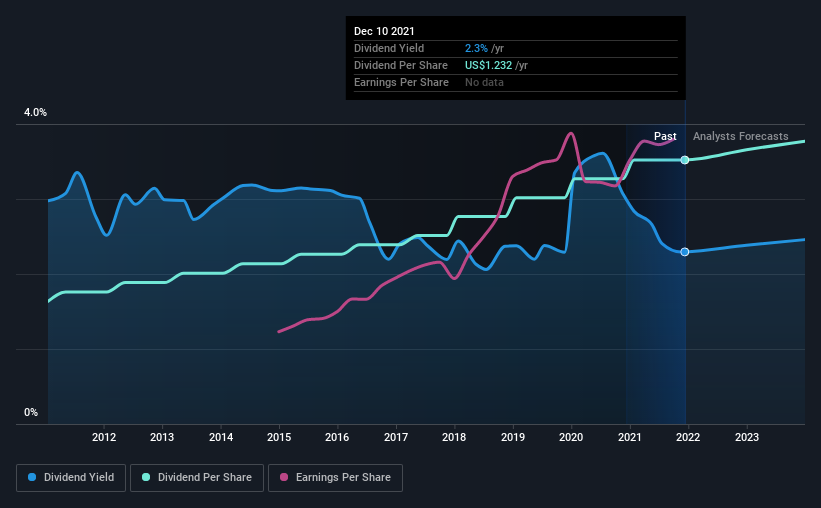Republic Bancorp, Inc. (NASDAQ:RBCA.A) Passed Our Checks, And It's About To Pay A US$0.31 Dividend
Regular readers will know that we love our dividends at Simply Wall St, which is why it's exciting to see Republic Bancorp, Inc. (NASDAQ:RBCA.A) is about to trade ex-dividend in the next four days. The ex-dividend date is usually set to be one business day before the record date which is the cut-off date on which you must be present on the company's books as a shareholder in order to receive the dividend. It is important to be aware of the ex-dividend date because any trade on the stock needs to have been settled on or before the record date. Accordingly, Republic Bancorp investors that purchase the stock on or after the 16th of December will not receive the dividend, which will be paid on the 21st of January.
The company's next dividend payment will be US$0.31 per share, on the back of last year when the company paid a total of US$1.23 to shareholders. Based on the last year's worth of payments, Republic Bancorp stock has a trailing yield of around 2.3% on the current share price of $53.69. If you buy this business for its dividend, you should have an idea of whether Republic Bancorp's dividend is reliable and sustainable. We need to see whether the dividend is covered by earnings and if it's growing.
View our latest analysis for Republic Bancorp
Dividends are typically paid out of company income, so if a company pays out more than it earned, its dividend is usually at a higher risk of being cut. Republic Bancorp paid out a comfortable 28% of its profit last year.
Generally speaking, the lower a company's payout ratios, the more resilient its dividend usually is.
Click here to see how much of its profit Republic Bancorp paid out over the last 12 months.
Have Earnings And Dividends Been Growing?
Stocks in companies that generate sustainable earnings growth often make the best dividend prospects, as it is easier to lift the dividend when earnings are rising. If earnings fall far enough, the company could be forced to cut its dividend. It's encouraging to see Republic Bancorp has grown its earnings rapidly, up 21% a year for the past five years.
Another key way to measure a company's dividend prospects is by measuring its historical rate of dividend growth. Since the start of our data, 10 years ago, Republic Bancorp has lifted its dividend by approximately 8.0% a year on average. We're glad to see dividends rising alongside earnings over a number of years, which may be a sign the company intends to share the growth with shareholders.
To Sum It Up
Should investors buy Republic Bancorp for the upcoming dividend? Typically, companies that are growing rapidly and paying out a low fraction of earnings are keeping the profits for reinvestment in the business. This is one of the most attractive investment combinations under this analysis, as it can create substantial value for investors over the long run. We think this is a pretty attractive combination, and would be interested in investigating Republic Bancorp more closely.
On that note, you'll want to research what risks Republic Bancorp is facing. Our analysis shows 1 warning sign for Republic Bancorp and you should be aware of this before buying any shares.
If you're in the market for dividend stocks, we recommend checking our list of top dividend stocks with a greater than 2% yield and an upcoming dividend.
Have feedback on this article? Concerned about the content? Get in touch with us directly. Alternatively, email editorial-team (at) simplywallst.com.
This article by Simply Wall St is general in nature. We provide commentary based on historical data and analyst forecasts only using an unbiased methodology and our articles are not intended to be financial advice. It does not constitute a recommendation to buy or sell any stock, and does not take account of your objectives, or your financial situation. We aim to bring you long-term focused analysis driven by fundamental data. Note that our analysis may not factor in the latest price-sensitive company announcements or qualitative material. Simply Wall St has no position in any stocks mentioned.

